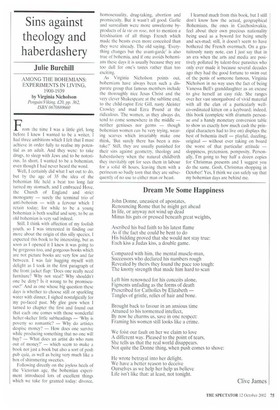Sins against theology and haberdashery
Julie Burchill
AMONG THE BOHEMIANS: EXPERIMENTS IN LIVING, 1900-1939 by Virginia Nicholson Penguin/Viking, £20, pp. 362, ISBN 0670889660 From the time I was a little girl, long before I knew I wanted to be a writer, I had three ambitions which I felt that I must achieve in order fully to realise my potential as an adult. And they were: to take drugs, to sleep with Jews and to be notorious. In short. I wanted to be a bohemian, even though I had never heard the word.
Well, I certainly did what I set out to do, but by the age of 35 the idea of the bohemian life held a beat too long fair turned my stomach, and I embraced Hove, the Church of England and strict monogamy — surely the terminal trio of anti-bohoism — with a fervour which I retain today; for while to be a young bohemian is both soulful and sexy, to be an old bohemian is very sad indeed.
Still. I think with affection of my foolish youth, so I was interested in finding out more about the origin of this silly species. I expected this book to be interesting, but as soon as I opened it I knew it was going to be gorgeous too, and gorgeous books which are not picture books are very few and far between. I was fair hugging myself with delight as I took in the first paragraph of the front jacket flap: 'Does one really need furniture? Why not steal? Why shouldn't one be dirty? Is it wrong to be promiscuous?' And as one whose big question these days is whether to choose still or sparkling water with dinner, I sighed nostalgically for my p0-faced past. My glee grew when I turned to chapter the first and found out that each one comes with those wonderful helter-skelter little subheadings — 'Why is poverty so romantic? — Why do artistes despise money? — How does one survive while producing something that no one will buy? — What does an artist do who runs out of money?' — which seem to make a book not just a book but also a sort of posh pub quiz, as well as being very much like a box of shimmering sweeties.
Following directly on the joyless heels of the Victorian age. the bohemian experiment introduced lots of excellent things which we take for granted today: divorce,
homosexuality, drug-taking, abortion and promiscuity. But it wasn't all good. Garlic and surrealism were more unwelcome byproducts of la vie en rose, not to mention a fetishisation of all things French which made the beasts even more conceited than they were already. The old saying, 'Everything changes but the avant-garde' is also true of bohemia, and if one avoids bohemians these days it is usually because they are too dull for one's tastes rather than too exciting.
As Virginia Nicholson points out, bohemians have always been such a disparate group that famous members include the thoroughly nice Jesus Christ and the very clever Shakespeare at the sublime end, to the child-rapist Eric Gill, nasty Aleister Crowley and mad Ezra Pound at the ridiculous. The women, as they always do, tend to come somewhere in the middle — neither geniuses nor germs — though bohemian women can be very trying, wearing scarves which invariably make one think, 'But surely there has been a mistake?' Still, they are usually punished for their sins against geometry, theology and haberdashery when the natural childbirth they inevitably opt for sees them in labour for a solid 48 hours, leaving them with a perineum so badly torn that they are subsequently of no use to either man or beast. I learned much from this book, but I still don't know how the actual, geographical Bohemians, the ones in Czechoslovakia, feel about their own precious nationality being used as a byword for being smelly and sex-mad; still, it doesn't seem to have bothered the French overmuch. On a gratuitously nasty note, can I just say that in an era when the arts and media are positively polluted by talent-free parasites who only ever made it because several decades ago they had the good fortune to swim out of the penis of someone famous, Virginia Nicholson in no way uses the fact of being Vanessa Bell's granddaughter as an excuse to give herself an easy ride. She ranges over her vast smorgasbord of vivid material with all the elan of a particularly wellco-ordinated kitten on a keyboard; indeed, this book (complete with dramatis personae and a handy monetary conversion table to show us exactly how much cash the principal characters had to live on) displays the best of bohemia itself — playful, dazzling, original — without ever taking on board the worst of that particular attitude — sloppiness, pretension, pomposity. Personally, I'm going to buy half a dozen copies for Christmas presents and I suggest you do the same. Gosh, Christmas shopping in October! Yes, I think we can safely say that my bohemian days are behind me.


































































































 Previous page
Previous page